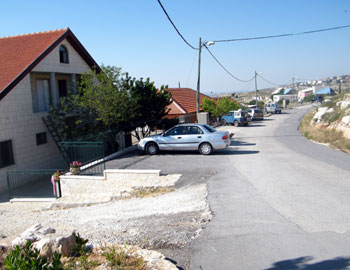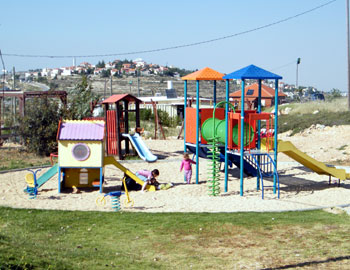5 May '10:
On 25 April 2010, the State Attorney's Office informed the High Court of Justice that it intended to consider approving the looting of land and unlawful construction involved in the establishment of the Derekh Ha’avot outpost, adjacent to the Elazar settlement in the Etzion Bloc. This statement follows nine years in which the state declared that construction in the outpost was carried out illegally. The statement also indicates that the state is ignoring its obligations under the Road Map, which was authorized by the government, to freeze construction in settlements and prohibit expropriation of Palestinian land and expansion of the settlements’ built-up areas. The State Attorney's Office's announcement was made in its response to a petition filed by Peace Now and residents of the adjacent Palestinian village of al-Khader, who claim that the outpost was built on village land.

Residential dwellings in the Derekh Ha'avot outpost, Bethlehem District. Photo: B'Tselem, 4 May 2010.
The Derekh Ha’avot outpost was built in February 2001, 500 meters from the jurisdictional area of the Elazar settlement. According to the report on outposts prepared by Attorney Talia Sasson and the database compiled by Brig. Gen. Baruch Spiegel, who was an assistant to the defense minister at the time, the outpost was built on privately-owned Palestinian land and on “survey land” (land whose ownership has not yet been determined). According to residents of al-Khader, the outpost was built on farmland that has been continuously cultivated by village residents for many years. Since the outpost was built, the Israeli law-enforcement authorities have not taken any steps to evacuate it.
In the State Attorney's Office's response to a petition Peace Now filed in 2008, the state agreed that the outpost was not authorized and that action was being taken against all the buildings in the outpost, including by means of stop-work orders and demolition orders, and that “no planning whatsoever” had been approved for the outpost. In light of the state’s position, the justices ordered, in July 2009, the state to provide a “clear timetable for carrying out the orders.”

Playground in the outpost. Photo: B'Tselem, 4 May 2010.
A timetable was never provided. In April 2010, the State Attorney's Office submitted a statement to the High Court. Quoting the Cabinet’s decision to freeze construction in the settlements temporarily, the State Attorney's Office contended that this task “requires the postponement of other enforcement actions,” adding that execution of the demolition orders relating to this outpost is in any case “not a high priority.”The State Attorney's Office further stated that it had been decided to proceed with land-survey procedures to determine the types of ownership of the land on which the outpost was constructed. If it is found that the buildings were constructed on state land, arrangement of the construction will be considered. If it is found, as the residents of al-Khader claim, that the structures were built on privately-owned Palestinian land, the state will execute “the demolition orders in accordance with the order of priorities.” The State Attorney's Office emphasized that due to the “political-security ramifications” of this procedure and the subsequent decision, the state does not deem it “justifiable” to set a timetable for carrying out the procedure.
The State Attorney's Office's position on the Derekh Ha’avot outpost sanctions the looting of land and the continuing, cumulative criminal construction in this outpost and in all the other settlements. Given the illegality of the settlements to begin with, B'Tselem demands that the government of Israel evacuate this outpost as well as all the other settlements.

هیچ نظری موجود نیست:
ارسال یک نظر